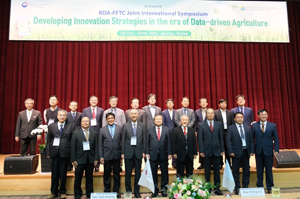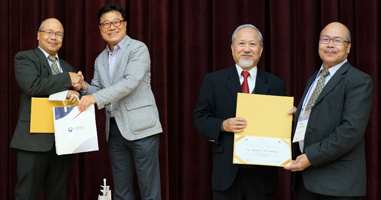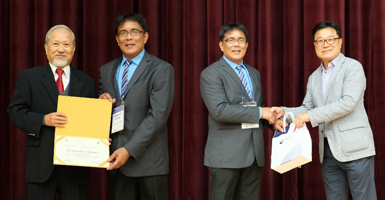 JEONJU, KOREA – Two Philippine technologies supported by the Department of Science and Technology (DOST) were presented in the recently concluded Joint International Symposium. It was organized by the Rural Development Administration (RDA) and Food and Fertilizer Technology Center for the Asia and Pacific Region (FFTC). The event was held at the International Conference Hall of RDA in Jeonju, Republic of Korea.
JEONJU, KOREA – Two Philippine technologies supported by the Department of Science and Technology (DOST) were presented in the recently concluded Joint International Symposium. It was organized by the Rural Development Administration (RDA) and Food and Fertilizer Technology Center for the Asia and Pacific Region (FFTC). The event was held at the International Conference Hall of RDA in Jeonju, Republic of Korea.
Titled, Developing Innovation Strategies in the era of Data-driven Agriculture, the symposium aimed to introduce and focus on research and development trends in the data-driven agriculture in the Asia Pacific, in the context of smart agriculture technology evolution.
Smart agriculture is one of the arising solutions for sustainable food production in response to the increasing demand for food.
Among the 13 international speakers where two Filipinos – Dr. Nelio C. Altoveros from the University of the Philippines Los Banos (UPLB) and Dr. Ronaldo T. Alberto from the Central Luzon State University (CLSU). Both presented smart agriculture efforts being implemented in the Philippines.
 Dr. Nelio C. Altoveros, a physicist and professor from UPLB and one of the project leaders of the Smarter approaches to reinvigorate agriculture as an industry (SARAI) Project, presented his paper, Project SARAI technology for climate-smart agriculture in the Philippines. SARAI is an action-research program funded by the Philippine Council for Agriculture, Aquatic and Natural Resources Research and Development of the Department of Science and Technology (DOST-PCAARRD). It aims to help small-scale farmers in managing risks brought by climate change. Moreover, SARAI provides site-specific crop advisories through forecasting and monitoring of nine priority products (rice, corn, banana, coconut, coffee, cacao, sugarcane, tomato, and soybean).
Dr. Nelio C. Altoveros, a physicist and professor from UPLB and one of the project leaders of the Smarter approaches to reinvigorate agriculture as an industry (SARAI) Project, presented his paper, Project SARAI technology for climate-smart agriculture in the Philippines. SARAI is an action-research program funded by the Philippine Council for Agriculture, Aquatic and Natural Resources Research and Development of the Department of Science and Technology (DOST-PCAARRD). It aims to help small-scale farmers in managing risks brought by climate change. Moreover, SARAI provides site-specific crop advisories through forecasting and monitoring of nine priority products (rice, corn, banana, coconut, coffee, cacao, sugarcane, tomato, and soybean).
Within two years of implementation, the project has branched out into other smart agriculture-related projects such as SARAI Enhanced Agriculture Monitoring System (SEAMS), Water-Balance Assisted Irrigation Decision Support System (WAISS), and Smarter Pest Identification Technology (SPId Tech).
SARAI is one of the smart agriculture programs in the Philippines that integrates technological advancements in information, communication, and technology (ICT) into traditional agriculture practices. This initiates innovation and modern technology into the mindset of Filipino farmers. In the future, SARAI looks forward to exploring the use of drone for seed and fertilizer dispersal. For more information about SARAI, visit http://sarai.ph/.
On the other hand, Dr. Ronaldo T. Alberto, CLSU professor and project leader of Phil-LiDAR (Light Detection and Ranging) Program 2, presented his paper, Remote sensing, UAV, and Spectroscopy: A Game changer in the Philippine Agriculture.
 Phil-LiDAR, one of the remote-sensing technologies used in the Philippines and a nationwide resource mapping project, is funded by DOST and monitored by the Philippine Council for Industry, Energy and Emerging Technology Research and Development (PCIEERD). It is a powerful remote sensing technology with a high accuracy output using laser pulses to map out the terrain of an area. It is mainly used for ecosystem management, mapping water resources, and other agricultural resources (coastal, forestry, renewable energy, and irrigation).
Phil-LiDAR, one of the remote-sensing technologies used in the Philippines and a nationwide resource mapping project, is funded by DOST and monitored by the Philippine Council for Industry, Energy and Emerging Technology Research and Development (PCIEERD). It is a powerful remote sensing technology with a high accuracy output using laser pulses to map out the terrain of an area. It is mainly used for ecosystem management, mapping water resources, and other agricultural resources (coastal, forestry, renewable energy, and irrigation).
The maps generated through the Phil-LiDAR serve as an early warning tool against flood hazards. It provides information that assists local governments units (LGU) in decision-making. All maps generated from the project were turned over to its stakeholders, the LGUs and farmers.
Implemented by the Institute for Climate Change and Environmental Management of CLSU, together with 15 state colleges and universities, this ICT tool will enable growers to precisely locate pests and disease-prone areas, nutrient-deficient soil areas, flood-prone areas, and crop suitability areas. To date, the project plans to establish a research center specifically for these technologies to secure its sustainability
For more information about Phil-LiDAR, visit http://phil-lidar.iccem.com.ph/.
The symposium was attended by scientists, researchers, and the private sector.
